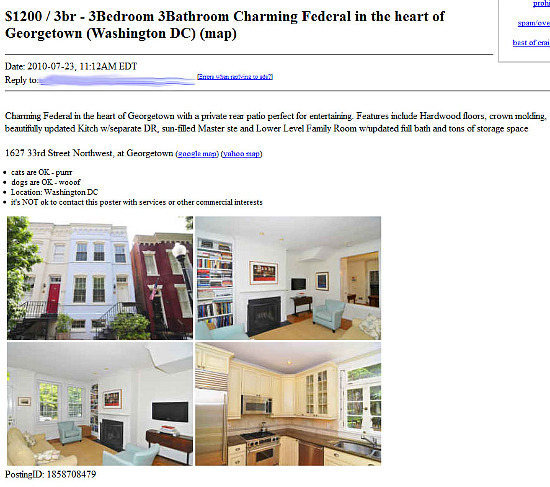What's Hot: Cash Remained King In DC Housing Market In 2025 | 220-Unit Affordable Development Planned Near Shaw Metro
 DC Apartment Hunters, Beware the Phantom Rental
DC Apartment Hunters, Beware the Phantom Rental
✉️ Want to forward this article? Click here.

ApartmentList released a study today that states that 5.2 million people nationwide have fallen prey to apartment rental scams, losing money along the way. In the DC area, that applies to an estimated 9.3 percent of renters that were surveyed. Additionally, 34 percent of renters in the region suspect that they have come across a fraudulent rental listing, with many of them citing "phantom listings" as the culprit. Today, UrbanTurf takes a look at how rental scams play out in the city.
Phantom listings are defined as apartment advertisements that either are made up entirely, advertise something that is not a rental at all, or use artificially low prices to lure a prospective renter. This type of scam is very prevalent online, with many people lured in by "good deals" posted on Craigslist and similar sites that offer the poster anonymity, as the Boston Globe reported last month.
In these instances, the scammer often uses addresses of homes that were previously for sale, recycling the pictures from the listing to make the rental seem legitimate and tacking on an almost suspiciously-low price. Many individuals who are enticed by these rentals are usually out of town and unable to check out listings in person, or are unaware of the market rent in a given area.
story continues below
loading...story continues above
Scammers are able to seal the deal by requesting money to be wired to them, a payment method that leaves the victim little recourse once they find out that they have been scammed. Other scams can include "catfishing", when a rental is advertised as having amenities it doesn't in order for the poster to get more money; bait-and-switch, when one rental is used to entice a renter but isn't the one available; and when rentals that are already occupied are listed as available.

While the elderly are typically thought of as being more vulnerable to scams, younger people tend to fall victim at a higher rate. To some extent, this may have a lot to do with younger people being more technology-dependent making it easier for scammers to have a wide reach. However, Apartment List's study is based on a survey of 1,126 renters, and 18-29 year olds may be disproportionately represented among the sample.
For those curious about whether they've encountered a scam, the Better Business Bureau has an advice page that goes into further detail. In general, however, always check rentals out in person when possible, always be suspicious of excessive misspellings and odd email addresses, and avoid anything that asks for your Social Security number or banking information.
See other articles related to: apartment list, craigslist, rental scams
This article originally published at https://dc.urbanturf.com/articles/blog/dc-apartment-hunters-beware-the-phantom-rental/14237.
Most Popular... This Week • Last 30 Days • Ever

Only a few large developments are still in the works along 14th Street, a corridor th... read »

Today, UrbanTurf is taking a look at the tax benefits associated with buying a home t... read »

Lincoln-Westmoreland Housing is moving forward with plans to replace an aging Shaw af... read »

The small handful of projects in the pipeline are either moving full steam ahead, get... read »

A potential innovation district in Arlington; an LA coffee chain to DC; and the end o... read »
DC Real Estate Guides
Short guides to navigating the DC-area real estate market
We've collected all our helpful guides for buying, selling and renting in and around Washington, DC in one place. Start browsing below!
First-Timer Primers
Intro guides for first-time home buyers
Unique Spaces
Awesome and unusual real estate from across the DC Metro














